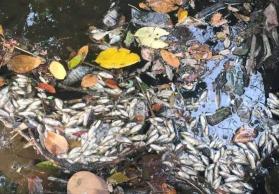Press Release: Landmark hearing begins at World Bank arbitration center
June 1, 2010
Contact: Alexis Stoumbelis, (202) 521-2510 ext. 205
As the second day of proceedings by Pacific Rim Mining against the government of El Salvador opens at the International Centre for the Settlement of Investment Disputes (ICSID), the Vancouver-based company continues to assert its unjustified claim for at least $77 million dollars in alleged lost profits after El Salvador denied its application for mining permits.
Vidalina Morales de Gámez, a member of the National Roundtable against Metallic Mining in El Salvador declared, “The company claims that its rights were violated under CAFTA [the US-Central American Free Trade Agreement], but the company failed to fulfill its obligations under Salvadoran law.” Ms. Morales de Gámez traveled to Washington, DC last week for a series of Congressional briefings organized by Public Citizen’s Global Trade Watch and Friends of the Earth concerning CAFTA’s highly-disputed investor rights provisions. “Now Pacific Rim wants a multimillion dollar handout from El Salvador, which is money we need to pay for social programs and to create long-term jobs for the poor and working class.”
Lisa Fuller, Program Director of the Committee in Solidarity with thePeople of El Salvador (CISPES), which organized a series ofdemonstrations in cities across the US to protest Pacific Rim'slawsuit, rejects the company's continued assertion of economic benefitfor El Salvador. “The mine, which would operate for just 6 years andemploy several hundred people, would bring very minimal economicbenefit to El Salvador.”
She cites El Salvador’s mining law, whichrequires only 2% royalties, and a recent report published by OxfamAmerica, Metals Mining and Sustainable Development in Central America,which concludes that “Mining usually does not bring sustainable netbenefits – and it may well undermine local economic well-being.” Shenotes, “Pacific Rim is the only party that stands to gain economically– either by extracting gold against the will of the people or by suingEl Salvador under CAFTA.”
In both 2005 and 2006 Pacific Rim applied to El Salvador’s Ministry ofthe Environment and Natural Resources (MARN) for exploitation permitsfor its El Dorado gold mining project in San Isidro, Cabañas. Bothtimes the MARN refused to grant permits due to severe deficiencies inthe Environmental Impact Assessment (EIA) and failure to complete aFeasibility Study. In a 2005 technical review, independenthydro-geologist Dr. Robert Moran concluded that Pacific Rim’s EIA“would be unacceptable to regulatory agencies in most developedcountries.”
In December 2007 Pacific Rim opened a subsidiary in Reno, NV, throughwhich it filed its Intent to Sue in December 2008, claiming that ElSalvador had violated the investor rights of CAFTA’s Chapter 10. ManuelPérez-Rocha, from the Institute for Policy Studies, which recentlypublished a study, Mining for Profits in International Tribunals, said,“This case is exemplary of the proliferation of foreign investors thatwant to use free trade agreements to threaten countries that attempt toprotect the human rights of their citizens.”
Pacific Rim proposes to use between 75 to 110 liters of water persecond and two tons of cyanide a day; due to this severe environmentalrisk, local communities have organized strong opposition to the minesince 2005. In contrast to the company’s unsubstantiated claim that thelocal communities are in favor of the project, polls conducted at theUniversity of Central America show that over 62% of the population isopposed to gold mining of any kind. Three prominent mining opponents,Marcelo Rivera, Ramiro Rivera and Dora Alicia Sorto Recinos, have allbeen murdered since June 2009.
ICSID is live video streaming the hearing proceedings, which commenceat 9:30 am Eastern time each day. The proceedings will be transmittedin both English and Spanish, and will be available in high speed (256kbps) and low speed (56 kbps) to accommodate different bandwidthcapabilities.
For the hearing in English, click here: mms://wbmswebcast1.worldbank.org/live1
For the hearing in Spanish, click here: mms://wbmswebcast1.worldbank.org/live2
To access the live stream you will need Windows Media Player, which is available for download at www.windows.com
Please see a detailed background report this case, the first environmental case under CAFTA.

 "I am a CISPES supporter because continuing to fight for social justice and a more people-centered country means continuing the dream and sacrifice of thousands of my fellow Salvadorans who died for that vision.” - Padre Carlos, New York City
"I am a CISPES supporter because continuing to fight for social justice and a more people-centered country means continuing the dream and sacrifice of thousands of my fellow Salvadorans who died for that vision.” - Padre Carlos, New York City

